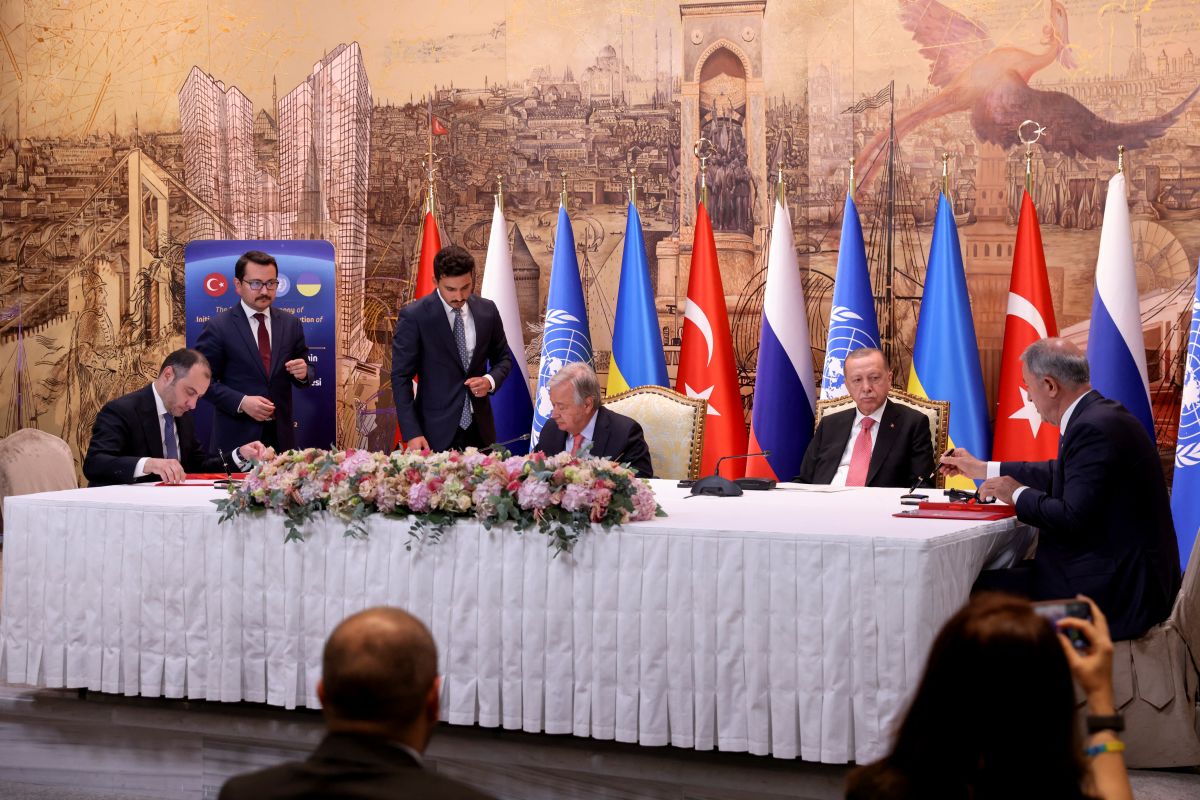Deal Signed to Unblock Ukrainian Grain Exports
At the initiative of the UN Secretary-General, the countries of Ukraine, Russia, and Türkiye reached an agreement on 22 July to unblock grain exports from Ukrainian Black Sea ports. However, the resumption of trade is not a foregone conclusion and will depend primarily on the goodwill of the Russian side, which may sabotage the implementation of the agreement by military means.
 UMIT BEKTAS/Reuters/Forum
UMIT BEKTAS/Reuters/Forum
What does the agreement provide for?
The agreement—formally two separate agreements (Ukraine-Türkiye-UN and Russia-Türkiye-UN)—envisages the creation of a humanitarian sea corridor through the Black Sea for commercial vessels sailing to collect grain to three Ukrainian ports in Odesa Oblast—Yuzhne, Chornomorsk and Odesa, and then Ukraine, Russia and Türkiye agreed to ensure safe navigation for these laden ships and to refrain from attacks on port infrastructure necessary for the implementation of the agreement. The vessels are expected to reach Ukrainian ports according to a timetable drawn up by the Joint Coordination Centre in Istanbul, specially established for this purpose and consisting of representatives of Ukraine, Russia, Türkiye, and the UN. Whenever a ship is crossing the Turkish straits en route to or from Ukrainian ports, the vessels, cargo, and crew will be jointly inspected by the four parties. The agreement was concluded for a period of 120 days, with an option for automatic renewal.
What is the significance for Ukraine of resuming grain exports by sea?
Unblocking grain exports from Ukrainian ports is vital for the Ukrainian budget, which needs urgent financial support in the wake of the Russian invasion. In the past, the sale of grain and agri-food products was one of the main parts of Ukraine’s foreign trade, bringing in as much as 40% of its export earnings. Ukraine was one of the world’s largest food producers (for example, it accounted for 10% of world wheat supplies), with as much as 90% of its grain exported by sea. The blockade of the Ukrainian coastline as a result of the ongoing hostilities has left tens of millions of tonnes of grain in storage, half of which was already expected to reach foreign buyers by the end of July this year, raising fears of a food crisis in developing countries. Alternative trade routes by land towards the Baltic Sea and the western Black Sea currently only allow for the transportation of around 10-20% of the volume to date, which translates into losses of up to $1-1.5 billion each month for Ukraine.
What are the chances the agreement will be implemented?
That the parties reached agreement does not mean the automatic resumption of grain exports through Ukrainian ports. A necessary condition for the unblocking of trade is that Russia actually ensures safe conditions for ships transiting the Black Sea and arriving at the Ukrainian coastline. Even while respecting the provisions for a secure maritime corridor, Russia could effectively counteract the implementation of the agreement by attacking Ukrainian port infrastructure with missiles and thus discouraging foreign operators from using the ports (which it indeed did shortly after the agreement was concluded by attacking the port of Odesa). In this context, Russia is likely to manipulate the imprecise wording of the agreement, arguing that the attacks are allegedly on military targets. The resumption of grain exports will also depend on market factors, especially final freight rates, which will include an additional insurance fee for the risk of a potential Russian attack on a merchant ship.
What risks does the unblocking of the Black Sea ports pose for Ukraine?
The agreement does not solve the Ukrainian dilemma of ensuring coastal security, and therefore Ukraine will probably be ready to open only a small maritime corridor in its territorial waters, leaving the rest of them mined. Ukraine has repeatedly expressed concern about the unblocking of its Black Sea ports, pointing out that a possible sea corridor could be used by Russia to attack the Ukrainian coast, particularly to land in Odesa. In a special statement in June this year, the Ukrainian Foreign Ministry made the creation of such a corridor conditional on the establishment of international patrols in the Black Sea and the acquisition of weapons capable of defending against attack from the sea. The first condition has not been met, but it is possible that Ukraine has obtained promises of supplies of appropriate armaments from some foreign partner (in May, it received Harpoon anti-ship missiles with launchers from Denmark).
Why did Russia sign the agreement?
It is likely that Russian was compelled to conclude the agreement on the condition of the simultaneous signing by the UN on the same day of a memorandum with Russia on support for Russian agricultural and fertiliser exports to world markets. The Russian authorities are therefore hoping for additional financial benefits, as Russia is one of the world’s largest producers of food and fertilisers, while retaining the ability to sabotage the agreement on Ukrainian grain exports and ports. It is likely that Russia will also try to use the UN memorandum to facilitate the sale of grain stolen in Ukraine abroad. It is also possible that the Russian government will invoke the agreement on Ukrainian ports to press Ukraine for a ceasefire at a convenient time, for example, during a Ukrainian counter-offensive in the south towards Kherson.


